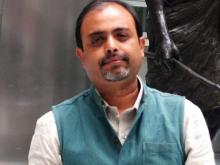
Topics and Regions
CEO of Landstack
Pranab is a passionate researcher and an empathetic soul, aspiring to make the world more equal and better for all. For about 30 years, he has been working around inter-disciplinary issues related to natural resources management and governance in global south, with governments, DFIs, (I)NGOs, and communities.
He started his journey as a Scientist with India’s National Agriculture Research System, developing model watersheds to restore hill landscapes and tribal livelihoods, that led to the prestigious National Award in 2002. To serve the development sector more flexibly, he left his job after a decade and since then, has expanded his engagements around water, livelihoods, forestry, and land, building evidence and making recognizable impacts, at the national and international level. He has led and guided large scale bilateral and multi-country projects around climate change, food security, forestry, biodiversity, and livelihoods and has planned, accompanied and evaluated donor-funded development and research projects around NRM, livelihoods, value chain and ecosystem services across South Asia. Pranab was a member in the executive committee of Green India Mission of Ministry of Environment Forest and Climate Change of Government of India during 2014-19.
He founded Center for Land Governance in 2015, which in a shot span was acknowledged as a leading land think tank around land governance policy and research in India and globally. Pranab’s land-engagement spans across rural, urban, forest and agriculture landscapes, focusing land tenure, use, administration and technology, cross-cutting gender, technology, justice, and sustainability. Apart from engaging on policy and action research with governments, the multilateral and Development Finance Institutions, academics, NGOs, and private sector, CLG organizes an annual India Land and Development Conference, a unique land convening in South Asia. He also teaches land related courses at Universities and B-Schools and trains senior government officials. He is invited to international and national conferences/ workshops as keynote speaker, session chair and panellist. Apart from writing blogs and in the national media, he publishes regularly in peer-reviewed journals. Towards building a land ecosystem in Global South and for embedding land tenure in the global and local development agendas, he has been triggering conversations, connections and partnerships among land actors and institutions working across sectors and geographies.
Details
Website
Location
Contributions
Displaying 1 - 9 of 9ILDC22022 : GLOBAL PULLS ON LOCAL LANDS - SOUTHERN PERSPECTIVES
Sixth edition of ILDC is being organized in hybrid mode during 7-9 December, 2022 with theme “Global Pulls on Local Lands : Southern Perspectives” at Bengaluru, India. The objective of this year's conference is to further and expand the scope of South-South Exchange around land conversations and cooperations, that began during the last episode, while the focus of the deliberations will continue to be on India.
Week-long Residential workshop on “Land Governance and Development” in Bengaluru, India
Date: - 5 - 10 December 2022
Theme: - Land Governance and Development
Venue: - Azim Premji University Campus, Bengaluru, India
Dr. Haque for People’s Haq over Land: A Farmers’ Economist Journey for Inclusive Land Rights
In Dr. Tajamul Haque’s untimely demise on 2nd May, India has lost a scholar policy maker, a champion of the causes of farmers, tribal, an advocate of land rights for women and dalits and a messiah for marginal farmers and tenants. With his departure, farmers lost a tireless, fearless advocate at the echelon of power corridors, while for ministers and secretaries, gone now is a highly knowledgeable yet an unassuming pragmatic advisor.
India’s SVAMITVA scheme: a public value perspective directs attention to inclusive innovation for rural property formalisation
Last month, India’s Prime Minister, Narendra Modi, issued the first 0.1 million Rural Property Cards (RPCs) to communities across more than 763 villages in six states in rural India under the SVAMITVA scheme.
Informality of land and labour poise to expand COVID Toll: Securing Land Tenure, also critical to secure Nutrition
Covid-19 pandemic has further worsened India’s hunger and malnutrition woes, more so for the millions of informal workers, now struggling to meet two ends in their rural homes, post the mass migration from their place of works, during lockdowns.
The Road to the India Land and Development Conference 2020: An Interview with Pranab Choudhury
The 4th India Land and Development Conference, set to start next week, invites a wide variety of individuals and institutions to engage in thought-provoking and interdisciplinary conversations and analyses. More specifically, the Conference's theme Institutions, Innovations and Informations in Land Governance invites us all to think about the role that information sharing can play in helping to ensure effective land governance.
Conservation & Development, both suffer when land tenure is not secure: India Land Conference
Conservation, said Aldo Leopold, is harmony between (wo)men and land. Land should justifiably figure not only into the conservation, but also in development debates, policy and discourses. Missing land rights and land tenure security can be costly for states, communities as well as local and global development.



